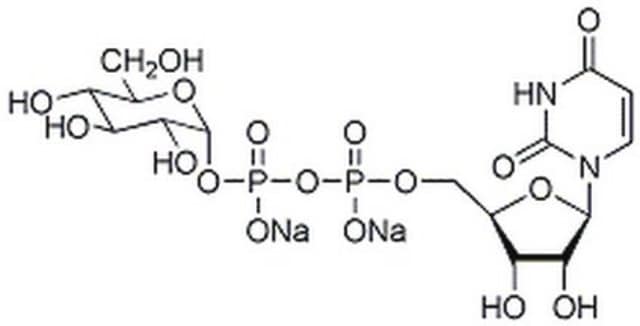T4272
Trehalose 6-phosphate dipotassium salt
~95% (TLC)
About This Item
Produits recommandés
Pureté
~95% (TLC)
Niveau de qualité
Forme
powder
Impuretés
<10% water (Karl Fischer)
Couleur
off-white,
Traces de cations
K: 14-17.3%
P: 5.8 - 6.7%
Application(s)
agriculture
Température de stockage
−20°C
Chaîne SMILES
[K].[H][C@@]1(O[C@H](CO)[C@@H](O)[C@H](O)[C@H]1O)O[C@H]2O[C@H](COP(O)(O)=O)[C@@H](O)[C@H](O)[C@H]2O
InChI
1S/C12H23O14P.K.H/c13-1-3-5(14)7(16)9(18)11(24-3)26-12-10(19)8(17)6(15)4(25-12)2-23-27(20,21)22;;/h3-19H,1-2H2,(H2,20,21,22);;/t3-,4-,5-,6-,7+,8+,9-,10-,11-,12-;;/m1../s1
Clé InChI
KSPIKJRSOAXHOT-PVXXTIHASA-N
Application
Actions biochimiques/physiologiques
Conditionnement
Autres remarques
Mention d'avertissement
Danger
Mentions de danger
Classification des risques
Acute Tox. 3 Dermal - Acute Tox. 4 Inhalation - Acute Tox. 4 Oral - STOT SE 1
Organes cibles
Eyes,Central nervous system
Code de la classe de stockage
6.1C - Combustible acute toxic Cat.3 / toxic compounds or compounds which causing chronic effects
Classe de danger pour l'eau (WGK)
WGK 3
Point d'éclair (°F)
Not applicable
Point d'éclair (°C)
Not applicable
Équipement de protection individuelle
Eyeshields, Faceshields, Gloves, type P2 (EN 143) respirator cartridges
Certificats d'analyse (COA)
Recherchez un Certificats d'analyse (COA) en saisissant le numéro de lot du produit. Les numéros de lot figurent sur l'étiquette du produit après les mots "Lot" ou "Batch".
Déjà en possession de ce produit ?
Retrouvez la documentation relative aux produits que vous avez récemment achetés dans la Bibliothèque de documents.
Les clients ont également consulté
Notre équipe de scientifiques dispose d'une expérience dans tous les secteurs de la recherche, notamment en sciences de la vie, science des matériaux, synthèse chimique, chromatographie, analyse et dans de nombreux autres domaines..
Contacter notre Service technique












